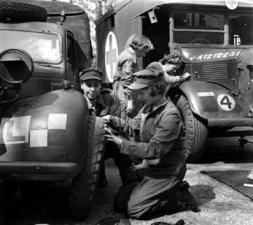By now we’ve all heard about how Queen Elizabeth was snubbed by Nicholas Sarkozy, who was apparently so dazzled by the prospect of Barack Obama’s visit that he neglected to invite the queen to any of the events commemorating the 65th anniversary of D-Day. (In a last-minute face-saver, Prince Charles agreed to attend instead.) Some people are blaming Gordon Brown, who was too busy trying to save his political skin to make sure the queen got her due. But the British press, which is having a field day over this royal faux pas, has directed most of its rage at Sarko, and at the ungrateful French in general.
The Daily Mail declared the snub “an insult to the memory of the 17,556 British and 5,316 Canadian troops who died to free France and are buried there.” Commentators in the same paper took things a step further, declaring Sarzkozy a “diminutive egomaniac,” and denouncing the French as cheese-eating surrender monkeys whose “widespread collaboration with the Nazi occupiers” made it all the more difficult for the British to “save” them from tyranny.
I don’t go in for France-bashing, and under normal circumstances, I couldn’t care less about anyone in the British royal family, or any of the pomp and protocol that surround them. I think it’s great that Michelle Obama dared to touch the queen–she could have given her a fist bump for all I care. In fact, I wonder why the Brits don’t just do away with the monarchy altogether, and save themselves a lot of money. (Although they’d still have to deal with MPs cleaning their moats at the public’s expense.) But when it comes to anything having to do with the Second World War, I’ve got a soft spot for the British in general, and in particular for HRH–who lives in my earliest memories as Princess Elizabeth.
I had a wartime childhood. When I was very small, we used to sitting around the radio, listening to Edward R. Murrow’s broadcasts from the streets of London during the Blitz.
Later, when America was in the war and my family lived in Washington, D.C., we listened with our blackout curtains drawn. I remember hearing the news about D-Day, and later seeing the newsreels when we went to the movies. Those were the sounds and images of my childhood.
I also have a clear memory of Princess Elizabeth, who was just ten years older than I was and still in her teens, speaking from the balcony of Buckingham Palace. I don’t know exactly when this happened or what she said, but I remember that she and her family seemed cheerful and apparently fearless despite being in a ravaged city, at the heart of a threatened land. Later, the princess worked as an ambulence driver in the Auxiliary Territorial Service. As the press has rightly pointed out, she is the last living head of state to have actually served in World War II.
It all sounds pretty sentimental, I know. But there’s something else going on here, as well–something that has to do with age and the generations. It is widely assumed that the 65th anniversary will be the last major gathering of D-Day veterans on the landing beaches, since the youngest of them are now in their 80s. Speaking at the American Cemetery on the cliffs over Omaha Beach this morning, President Obama talked about a veteran of the 101st Airborne who had come to Normandy for the anniversary, and died last night in his sleep.
None of the heads of state present at the ceremonies was even alive during the war. If the queen had been there, at least she would be commemorating a lived experience–not something recorded in history books and PBS documentaries, and remembered by fewer and fewer of us with every passing year.
.
Elizabeth Windsor changing a tire during her service with the ATS.
This post also appears on Unsilent Generation, James Ridgeway’s blog on the politics of aging.







